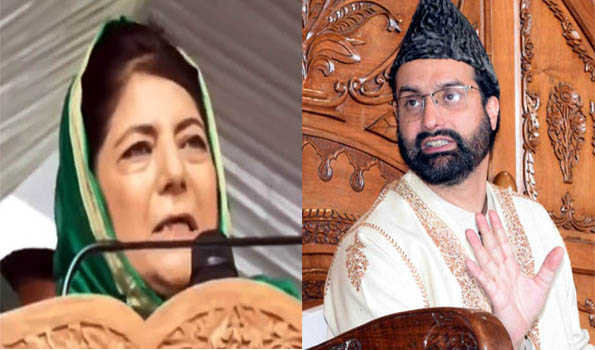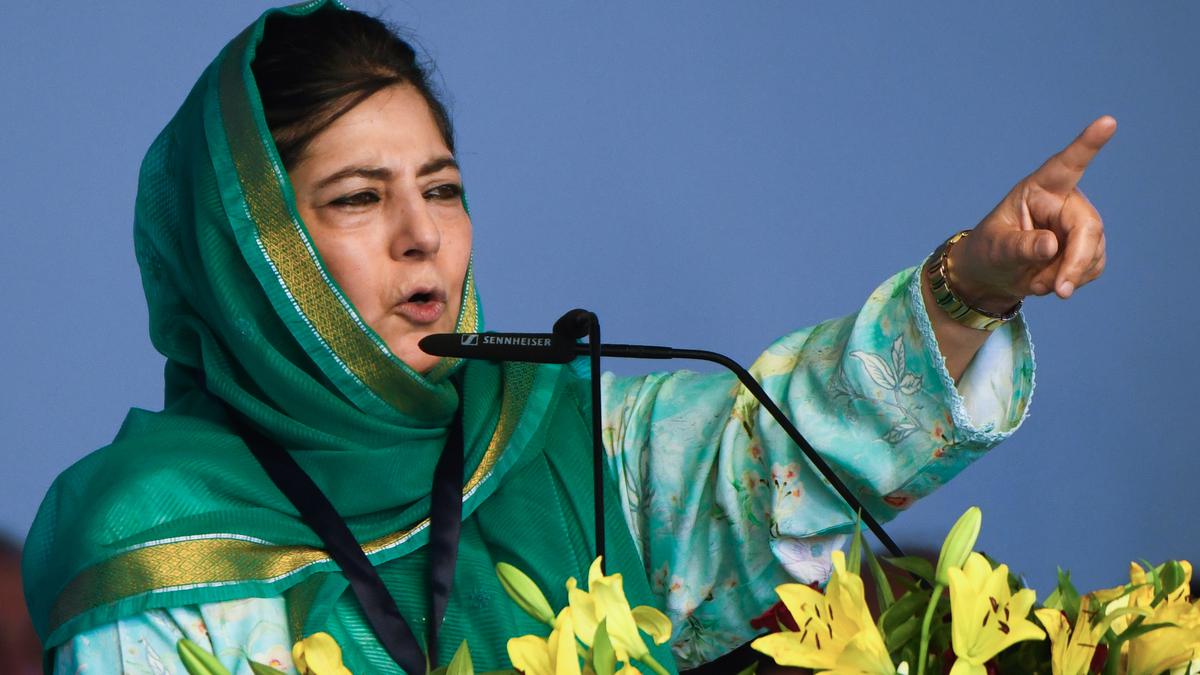Eid in Kashmir: A Celebration Overshadowed by Restrictions
For the seventh consecutive year, Eid prayers have been barred at Eidgah and Jama Masjid in Srinagar, leaving many Kashmiris feeling deprived of their fundamental right to worship. The historic congregational prayers, which once brought thousands together in unity and faith, were denied yet again. This year, as in previous ones, the mosque gates were locked, and police personnel were deployed outside to prevent entry.
Mirwaiz Umar Farooq Under House Arrest
Hurriyat Chairman Mirwaiz Umar Farooq, a prominent religious and political leader who traditionally leads the Eid prayers at Jama Masjid, was once again placed under house arrest. In a statement, he conveyed his disappointment and sorrow:
“Eid Mubarak! Yet again, Kashmir wakes up to the sad reality: no Eid prayers at Eidgah, and Jama Masjid locked down — for the 7th straight year. I too have been detained at my home.”
His confinement and the enforced closure of Srinagar’s largest mosques have fueled frustration and resentment among the people, who view these measures as an infringement on their religious freedoms.
Political Reactions & Public Sentiment
Former J&K Chief Minister Omar Abdullah also voiced concern over the repeated denial of the right to congregational prayer, emphasizing the peaceful intent of the gatherings.
“The same people who condemned the Pahalgam attack should be trusted to gather peacefully for Eid,” he stated.
Other political leaders, including Mehbooba Mufti, have urged the administration to respect religious sentiments and reconsider the repeated imposition of restrictions.
“Denying people the right to pray on Eid goes against the very spirit of our democratic and secular ethos,” Mufti remarked.
The persistent ban has sparked outrage not only in the Valley but also among diaspora communities and human rights advocates, who see it as a symptom of deeper political and social alienation.
A Divided Eid Celebration
While the Hazratbal Shrine hosted the largest Eid congregation in Kashmir, drawing thousands of worshippers, the mood remained subdued across the Valley. Many expressed disillusionment over the stark contrast between the vibrant Eid celebrations in other parts of India and the lockdown in Srinagar.
On social media, images of closed mosque gates juxtaposed with jubilant celebrations from other states have led to questions about fairness, selective enforcement, and the silence of elected representatives from the region.
Looking Ahead: Will Restrictions Ever Be Lifted?
Since 2019, when Jammu & Kashmir’s special status was abrogated and the state was downgraded to a Union Territory, there has been a noticeable tightening of public and religious expression. Eid prayers at Jama Masjid and Eidgah have since remained banned under the pretext of security and public order.
Residents and religious leaders continue to demand clarity: Is this a temporary measure tied to genuine threats, or a new normal designed to suppress dissent and erode Kashmiri identity?
Legal Challenges & Historical Precedents: Restrictions on Eid Prayers in Kashmir
The ongoing denial of congregational Eid prayers at historic sites like Eidgah and Jama Masjid raises serious legal and constitutional questions.
📜 Constitutional & Legal Aspects
1. Right to Religious Freedom – Article 25 of the Indian Constitution
Article 25 guarantees all citizens the freedom to profess, practice, and propagate their religion. This includes the right to gather and perform prayers. The repeated restrictions on Eid congregations bring into question the balance between this fundamental right and state-imposed limitations.
2. Public Order vs. Religious Freedom
Authorities have cited public safety and law-and-order concerns as reasons for the continued restrictions. However, legal scholars argue:
- Generalized security threats cannot justify indefinite bans on religious practice.
- The state has a responsibility to facilitate safe, peaceful gatherings rather than enforce blanket prohibitions.
- Managed access, surveillance, and crowd control are more democratic approaches.
3. Legal Precedents & Court Challenges
Several court rulings have emphasized the need for proportionate and narrowly defined state intervention in religious matters:
- Shayara Bano vs. Union of India (2017): Upheld the principle that religious practices must align with constitutional morality.
- Farooqui vs. State of UP (2018): Asserted that government interference in religious events must be minimal and legally justified.
- J&K High Court (2023): Highlighted that permanent bans on religious congregations require specific, time-bound justifications, not vague generalities.
These judgments suggest that the indefinite denial of Eid prayers at central religious venues may not stand up to judicial scrutiny if challenged.
Conclusion: A Crisis of Rights and Recognition
The continued denial of Eid congregational prayers in Srinagar reflects more than just a security concern. It underscores a deeper crisis of trust, identity, and constitutional rights. As calls grow louder for the restoration of normalcy and religious freedom, the administration must consider whether its approach fosters peace or perpetuates alienation.
Until then, Eid in Kashmir will remain a bittersweet affair — a sacred celebration shadowed by locked gates, silenced sermons, and a yearning for dignity and recognition.
Kashmiri Leaders Demand Justice: Mehbooba Mufti & Mirwaiz Umar Farooq Call for Prisoners’ Release & Dialogue
Following the inauguration of the Vande Bharat Express connecting Katra to Srinagar, Peoples Democratic Party (PDP) president Mehbooba Mufti and Hurriyat Chairman Mirwaiz Umar Farooq welcomed the rail initiative but urged the release of Kashmiri prisoners as a confidence-building measure.
‘Bridge Dil Ki Doori’: Mirwaiz’s Appeal to PM Modi
During his Friday sermon at Jama Masjid, Srinagar, Mirwaiz Umar Farooq emphasized that while train links are welcome, it is the human links that truly matter. He urged Prime Minister Narendra Modi to reduce the ‘distance of hearts’ by ordering the release of political prisoners.
Key Points from Mirwaiz’s Statement:
- Thousands of Kashmiri youth, political leaders, and activists remain incarcerated, many without trial.
- Eid should be marked with a humanitarian gesture, ensuring justice and reconciliation.
- Recent incidents, including the death of Kashmiri trader Zubair Ahmad Bhat in Delhi, have raised concerns about the safety of Kashmiris across India.
Mehbooba Mufti’s Call for Statesmanship & Reconciliation
Mehbooba Mufti echoed Mirwaiz’s sentiments, urging PM Modi to show statesmanship by releasing Kashmiri detainees, particularly youth arrested post-Pahalgam attack.
Her Key Statements:
- Kashmiris have collectively condemned terrorism, proving their commitment to peace.
- Prolonged detentions deepen alienation and hinder reconciliation efforts.
- Eid should be a moment of healing, not a reminder of suffering.
Historical Precedents: Prisoner Releases in Kashmir & Their Impact on Stability
Past Instances of Prisoner Releases in J&K
- Atal Bihari Vajpayee’s Era (2000–2004):
- The India-Pakistan peace process saw the release of Kashmiri detainees as a confidence-building measure.
- Several political detainees and civilian prisoners were freed to encourage dialogue.
- 2006–2008: Mufti Sayeed & Manmohan Singh’s Efforts:
- The Rehabilitation Policy for Kashmiri Youth allowed return of ex-militants who had crossed into Pakistan-administered Kashmir.
- Hundreds of civilian prisoners were released in hopes of fostering peace and reintegration.
- 2018: Mehbooba Mufti’s Initiative as J&K CM:
- First-time offenders and youth detained on minor charges were released in batches to prevent radicalization in jails.
- The move was seen as an attempt to restore trust with younger Kashmiris.
- Post-2019: Article 370 Abrogation & Widespread Detentions:
- Following the revocation of J&K’s special status, thousands of political leaders, activists, and youth were detained under preventive laws like PSA (Public Safety Act).
- While some releases occurred gradually, many remain incarcerated, raising concerns over civil liberties and prolonged detention.
Impact on Stability & Kashmir’s Future
Positive Effects of Past Releases:
- Helped reduce alienation, making local leadership feel heard.
- Facilitated dialogue-based conflict resolution, rather than relying on security crackdowns.
- Allowed families to reunite, improving public sentiment towards peace efforts.
Potential Challenges:
- Security concerns regarding the reactivation of released individuals in militancy.
- Political disagreements over which detainees qualify for release.
- Fear that releases might be temporary, with re-arrests soon after.
Will the Centre Act on Mehbooba & Mirwaiz’s Request?
While PM Modi has focused on development initiatives, will prisoner releases become part of the broader reconciliation efforts? Given historical precedents, if the government aims to address Kashmir’s long-term stability, selective releases could be a powerful goodwill measure.



